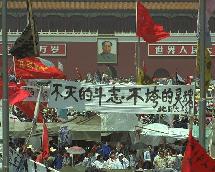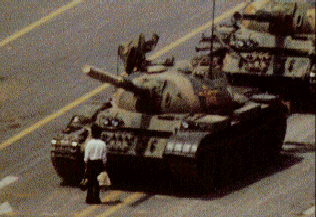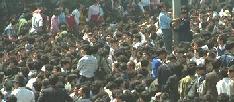![[Blurb]](weilin.txt.gif)
 single junior in the world should immediately prepare a canned
answer for, goes something like this: If you could meet anybody you
wanted from history, who would it be? That question set me to
thinking. Presidents, statesmen, civil rights activists,
authors--all would be horribly clichéd. With that in mind, I
decided on the one person whom I have always wanted to
meet.
single junior in the world should immediately prepare a canned
answer for, goes something like this: If you could meet anybody you
wanted from history, who would it be? That question set me to
thinking. Presidents, statesmen, civil rights activists,
authors--all would be horribly clichéd. With that in mind, I
decided on the one person whom I have always wanted to
meet.A man I have always desired to meet is a tall and gaunt former resident of Beijing, China. His name, purportedly, is Wang Weilin. In all probability--although his image and his actions were broadcast on almost every television around the world, although the photograph of his one immortal moment appeared in every major magazine in the United States--the name is an unfamiliar one even to the most avid follower of the news. Wang Weilin was the man who stood unflinching in front of a convoy of tanks moving their way up the ironically named 'Pathway of Everlasting Peace' from Tianamen Square in early June 1989.

 I do not know what I would say to this brave man after our initial
introduction and inevitable pleasantries. It is doubtful, in fact,
that our respective languages would even permit communication at
all. But what more could I say, after all, than a heartfelt "thank
you"? I do not even know why I would thank him--certainly, his
bravery accomplished nothing tangible; surely, the scant five-minute
delay of the column of armored infantry he caused made no
substantial dent in the body count of that fateful uprising. And
yet, despite the fact that we would have nothing to talk about,
despite the fact that the value of his action was largely symbolic,
this man stands out to me more than any other person I have ever
seen or read of as the very essence of courage; and, for that
reason, I would like to meet him--if for no other reason than to
have met him. I was but eleven years old at the time of the
Tianamen Square massacre, and the parades of bloody students on the
nightly news are now nothing more than blurry memories. The image of
this man, however--the image of this Wang Weilin--remains
indelibly burned into my mind, as sharp as it was when I first
viewed it. More than the chants, the hunger strikes, or the massacre
itself, the picture of that lone figure blocking the slowly
advancing line of camouflage-painted tanks has haunted me for
years.
I do not know what I would say to this brave man after our initial
introduction and inevitable pleasantries. It is doubtful, in fact,
that our respective languages would even permit communication at
all. But what more could I say, after all, than a heartfelt "thank
you"? I do not even know why I would thank him--certainly, his
bravery accomplished nothing tangible; surely, the scant five-minute
delay of the column of armored infantry he caused made no
substantial dent in the body count of that fateful uprising. And
yet, despite the fact that we would have nothing to talk about,
despite the fact that the value of his action was largely symbolic,
this man stands out to me more than any other person I have ever
seen or read of as the very essence of courage; and, for that
reason, I would like to meet him--if for no other reason than to
have met him. I was but eleven years old at the time of the
Tianamen Square massacre, and the parades of bloody students on the
nightly news are now nothing more than blurry memories. The image of
this man, however--the image of this Wang Weilin--remains
indelibly burned into my mind, as sharp as it was when I first
viewed it. More than the chants, the hunger strikes, or the massacre
itself, the picture of that lone figure blocking the slowly
advancing line of camouflage-painted tanks has haunted me for
years.All my life emphasis has been placed on what I can accomplish through academic means. Since childhood, grades have infiltrated my life as both a goal to strive for and a touchstone with which to determine my own worth. Not enough emphasis, I think, has been placed on what I can accomplish with the part of my mind that is not entirely rational and reasonable--on that part of my mind which eschews logic in favor of beauty. When I see people in history who possess the passionate courage of a Wang Weilin, the same thought always passes through my mind: were I in their situation, could I muster the courage to have chosen the path they did? Would I have had the gall to risk my livelihood, my liberty, perhaps my life in doing something I considered right? When I read of selfless and heroic martyrs I am always impressed by their bravery and I wonder if in myself, too, there resides the ability to rise and display that courage that I so respect in others. And that, perhaps, would be the real reason I would wish to meet Wang Weilin: to see him, to talk to him, to assure myself that he, too, is a person similar to myself. Perhaps by meeting him, I could confirm that this Wang Weilin shares many of the likes and dislikes I have, that he has pet peeves and nervousness and inane habits; and, by seeing that we possess in common our humanity, perhaps I could imagine that in myself, too, is the courage which Wang Weilin so elegantly displayed one summer's day in June when he pitted himself against an army tank and won.

I will never be able to meet Wang Weilin; although there are no official reports on his current whereabouts, and even his real name is uncertain, unofficial leaks point to his execution by firing squad a few months
 following the June 1989 massacre. Without recognition, his life
passed from the pages of history like a soldier slain and
immediately forgotten. His death, as well as his life, is a
sobering reminder of how much courage is required from us all as we
journey onwards in what will always remain an imperfect world
striving painfully for perfection. Wang Weilin is one person who
displayed that courage beautifully when it was required from him; it
is on the shoulders of people like him that the future rests. It can
only be hoped that there are many among us who can display a similar
courage when our own testing times come.
following the June 1989 massacre. Without recognition, his life
passed from the pages of history like a soldier slain and
immediately forgotten. His death, as well as his life, is a
sobering reminder of how much courage is required from us all as we
journey onwards in what will always remain an imperfect world
striving painfully for perfection. Wang Weilin is one person who
displayed that courage beautifully when it was required from him; it
is on the shoulders of people like him that the future rests. It can
only be hoped that there are many among us who can display a similar
courage when our own testing times come.Andrew Ho (ag-ho@uiuc.edu) | writings